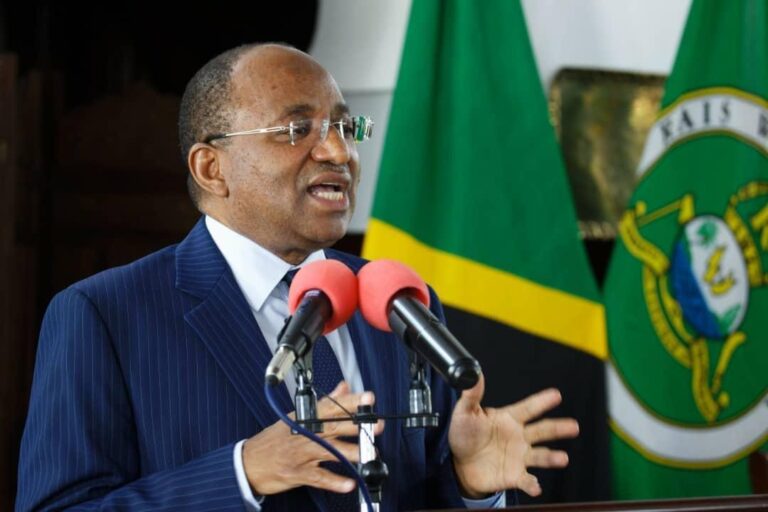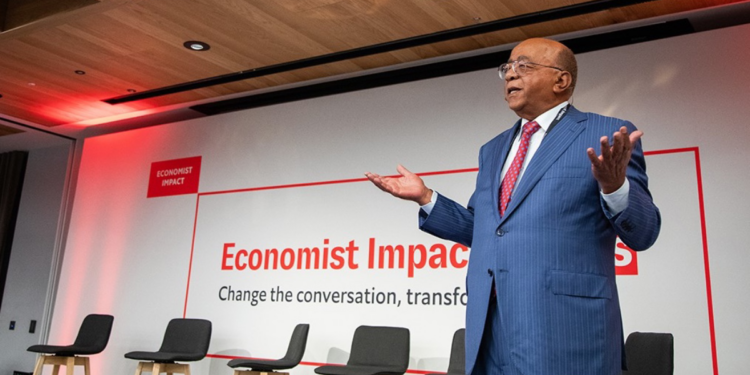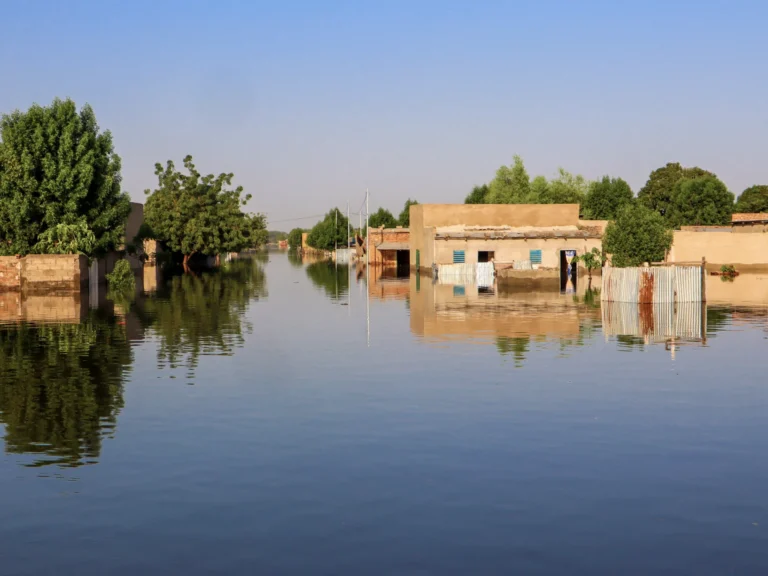- AIM Congress starts with pre-event workshops on investment and innovation
- How South Africa plans to counter the negative impact of Trump tariffs sting
- Africa’s BPO industry enters AI era with 40% of tasks at risk by 2030
- Trump tariffs sting set to ruffle several economies in Africa
- Africa Energy Bank secures key backing from Nigeria, Angola and Ghana
- AIM Congress 2025 gets a boost as International Development Bank signs on as gold sponsor
- African energy: Opportunities and challenges presented by Russia’s investments
- Africa’s smart farming push—a revolution or a mirage?
Browsing: Climate change
- Zanzibar has an ambitious plan to become the leading hub for blue economy in the East African Community (EAC).
- However, adverse impact of climate change is affecting the establishment of blue economy systems in the Island.
- To counter the challenges, the AfDB is supporting human development in Zanzibar as basis to setting up blue economy.
Zanzibar aims to be the leading hub for blue economy activities in the Western Indian Ocean region even as adverse impacts of climate change threaten to derail the island’s plan to tap into the emerging sector. At the moment, Zanzibar recognises the role of the blue economy in promoting socio-economic development through better stewardship of the sea and related resources.
This affirmation is made in the introduction of the Zanzibar blue economy policy by the Minister of Finance and Planning, Ambassador Mohamed Ramia Abdiwawa.
The policy holds that the sector will prioritize fisheries and aquaculture, …
- Through PPPs, smart financing models, and new policies, Zambia is positioning itself as a leader in renewable energy.
- The government’s commitment to achieving universal electricity access by 2030 underpins Zambia’s solar revolution.
- One of the flagship projects is the 600MW Scaling Solar Zambia, an alliance between the government and the International Finance Corporation (IFC).
Landlocked Zambia is making a spirited push to compete favourably among African economies by tapping the power of solar energy to light up rural homes and drive industry.
With more than 70 per cent of its population living in areas where access to electricity remains a distant dream, Zambia’s solar energy drive is a beacon of hope, offering sustainable and renewable energy solutions to combat energy poverty.
This ambitious initiative is about more than electrifying homes; it’s about transforming lives, driving economic growth, and safeguarding the environment.
Through public-private partnerships, innovative financing models, and policy frameworks, …
- Nigeria is pioneering the journey towards getting a strong foothold in the carbon credit market.
- The nation is aligning as part of continental effort under the African Carbon Markets Initiative (ACMI) that aims to mobilize up to $100 billion carbon credits per year by 2050.
- During the COP29 talks, Canada and Nigeria announced an alliance to create an innovative carbon credit model to support Abuja’s economic and ecological development.
The African continent is facing increasing climate change impacts that are increasingly chocking the life of its struggling economies. With policymakers running out pf options to counter the economic slide, the emergence of the African Carbon Markets Initiative (ACMI) offers innovative options that could help unlock the continent’s carbon credit potential. A number of countries such as Nigeria are emeging as pioneers in tapping the gains that carbon markets present.
At this year’s United Nation Climate Change Conference of Parties …
- Scheduled for 24th to 25th October in South Africa, the Sustainability Week Africa forum will explore the challenges and solutions being deployed across industries to tackle climate change.
- Keynote speakers will share innovative ideas on how businesses can support the continent in adopting sustainable practices faster in the face of climate change.
- The first edition of Sustainability Week Africa comes at a time when governments and businesses across Africa are grappling with the negative impacts of extreme weather events.
This week, policymakers will be closely following the proceedings at the Economist Impact’s Sustainability Week Africa, where keynote speakers will be sharing innovative ideas on how businesses can support the continent in adopting sustainable practices faster in the face of climate change.
The forum, which is scheduled for 24th to 25th October in South Africa, aims at amplifying challenges and the latest solutions being deployed across industries including agriculture, housing, …
- Dutch climate action organization DGB Group aims to restore 12,000 hectares of native forests in Ethiopia’s mountainous region.
- DGB’s iconic bamboo project has been added to the prestigious Verra Verified Carbon Standard (VCS) registry.
- This move ensures that the project not only restores lost ecosystems but also generates measurable, verifiable carbon credits, which are vital element on carbon finance.
Ethiopia, known for its stunning landscapes and rich cultural history, is now setting the stage for a new chapter in sustainability, and a chance to tap billions in climate finance. An ongoing reforestation initiative, spearheaded by Dutch climate action organization, DGB Group, is poised to transform the country’s environmental and economic future.
By restoring vast tracts of native forest, Ethiopia is taking giant strides towards securing its place in the global carbon finance market—a move that could unlock billions in climate finance.
Ethiopia’s ambitious carbon project
In a historic move, Ethiopia’s …
- Since late June, heavy rains have hit parts of Sudan, including South Darfur, Red Sea, River Nile, and Northern states, affecting around 500,000 people.
- In Chad, at least 340 people have lost their lives, and nearly 1.5 million people have been impacted, with over 160,000 homes destroyed by floods.
- Nearly a third of Lesotho’s population—about 700,000 people—are at risk of food insecurity in the coming months due to historic drought gripping the country.
Extreme weather patterns continue to batter Africa, plunging millions of people into a deepening humanitarian crisis. From the ongoing catastrophic floods in Sudan and Chad to the severe drought crippling Lesotho, and other economies in the southern Africa region the impacts of climate change are starkly evident across the continent.
As floods displace families, destroy homes, and disrupt agriculture, drought worsens food insecurity, leaving communities on the brink of disaster.
Sudan and Chad drenched by devastating floods
…- Ahead of COP29, Africa’s climate finance strategy is based in three core pillars: scaling up adaptation funding, boosting mitigation efforts, and improving access to carbon markets.
- Without financial support, Africa could experience an annual loss of 5% of its GDP by 2040 due to adverse weather.
- While the stakes are high, populations across the continent will be watching to see how global powers will answer Africa’s plea.
As leaders from across the world ready to gather in Baku, Azerbaijan, for the 29th United Nations Climate Change Conference (COP29), Africa is rallying for a spirited push to secure climate finance deals at scale.
This agenda was unveiled at the 12th Conference on Climate Change and Development in Africa, hosted by Ivory Coast in Abidjan. This meeting was held on the sidelines of the 1oth Special Session of the African Ministerial Conference on the Environment (AMCEN).
Bringing together stakeholders such as …
- Tanzania e-waste is growing rapidly and Dar es Salaam is quickly becoming a major informal recycling site.
- The country’s predicament is reflected across East Africa due to exponential uptake of digital products, creating a scenario akin to Agbogbloshie, the infamous 20-acres e-waste dump in Accra, Ghana.
- Often referred to as a “digital dumping ground,” Agbogbloshie receives discarded electronics from various countries, including the United States and Europe.
E-waste and scrap metal are notoriously polluting the environment around the world and the worst hit are third-world countries, and Africa is at the top of the list. Take for instance the infamous Agbogbloshie, a roughly 20-acre scrap yard in Accra the capital city of Ghana.
Over the last decade, Agbogbloshie has become the symbol of this growing crisis, that is, export, dumping and trading of electronic wastes. And while this humongous dump site may be the biggest but it is far …
- Torrential rains have caused terrible floods in Kenya, causing the death toll to reach more than 200, and more than 280,000 people affected.
- Over the years, both governments in Kenya and Tanzania have struggled to finance disaster management systems.
- Tanzania’s commercial pulse, Dar es Salaam’s economy, and infrastructure suffer from frequent and severe flooding, and the situation will worsen without major interventions.
“Tomorrow I am turning 24, and in 2030, I will be 30; seeing all these situations (floods) puts me in a scary position for my future,” Jeffrey Mboya, a Kenyan climate activist, told CNN International correspondent Larry Madowo, as flooding destroys his community.
Lost lives, destructed communities, stranded tourists, broken bridges, and closed-off roads are currently becoming the new normal in Kenya and Tanzania as the two neighboring nations experience floods and cyclones.
Torrential rains have caused terrible floods in Kenya, causing the death toll to reach more …
- The urgency to transform African food systems is not solely an agricultural or economic imperative but a moral, social, and ecological one.
- Africa is confronted with a heavy crisis of malnutrition, poverty, inequality, and unemployment. Food affordability and access are unevenly distributed, and gaps widen even further.
- Improving the performance of the food system is critical if we are to sustainably feed nearly 10 billion people by 2050 while raising farmer incomes, protecting them from climate change, and helping them to thrive.
Africa, a continent of great potential, stands at a crossroads. Africa has most of the world’s most fertile lands, immense resources, and a growing young population. However, it remains paradoxically entangled in the danger of food insecurity and malnutrition.
Challenges such as climate change, post-harvest losses, poor farming technologies, and inadequate supply chains persist. The urgency to change African food systems is not solely an agricultural or economic …









